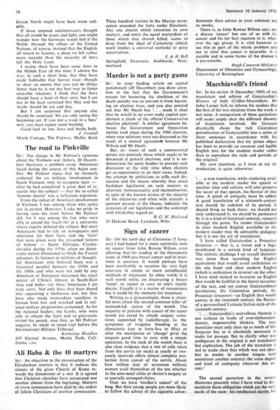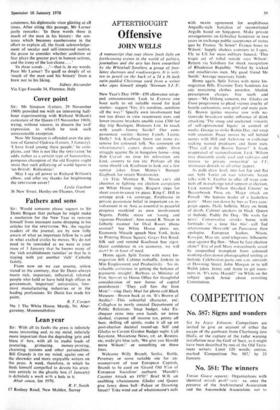Macchiavelli's friend
Sir: In his review (6 December 1969) of my translation and edition of Guicciardini's History of Italy (Collier-Macmillan), Mr John Lamer fails to inform his readers that the first of his two citations from the work is not mine. A comparison of these quotations will make amply clear the different theories of translation involved. Mr Grayson drastically chops the rich Ciceronian periodisation of Guicciardini into a series of short sentences in accordance with his published declaration that his 'prime object has been to provide an accurate and legible English text for the modern reader rather than to reproduce the style and periods of the original' My own intention, as I state in my in- troduction, is quite otherwise: a true translation, while rendering avail- able to the modern reader the speech of another time and culture, will also preserve the savor of that speech, the flavour of that time. A pinch of antiquity must be added.
A good translation of a sixteenth-century
text should be redolent of its period. It should bring us back there: we should not only understand it, we should be permeated by it in a kind of historical osmosis, research through the pores. To render Guicciardini in clear modern English available to the modern reader may be admirable pedagogy but it is not the art of translation.
'I have called Guicciardini a Proustian historian — that is, a vision and a logic manifested in a certain kind of language. The stylistic challenge I set myself therefore was more than searching for English equivalents that would avoid archaicism on the one hand and clear modern English (which is archaicism in reverse) on the other. I have tried instead to re-create an English that would be faithful to the literal meanings of the text, and yet convey Guicciardinian involutions, his Ciceronian periods, his Proustian longueurs—an English that would convey in the twentieth century the flavour of a personalised Latinate Italian style of the sixteenth century.
. . Guicciardini's marvellous rhetoric is not without its faults of over-elaboration. density, impenetrable thickets. The true translator must only clear up as much of this Sargasso Sea as is absolutely necessary to make for passage. But to clarify what was ambiguous in the original is not translation but explication. The job of the translator is not to make clear that which was not clear, but to render in another tongue (and sometimes another century) the same degree and kind of ambiguity wherever this oc- curs:
The second quotation in the review illustrates precisely what I have tried to do: maintain those obliquities which are the very mark of the man: his intellectual clarity, his
astuteness, his diplomatic visor glinting at all times. After citing this passage, Mr Lamer justly remarks: 'In these words there is much of the man in his history: the sen- tence which becomes cumbersome in the effort to explain all, the frank acknowledge- ment of secular and self-interested motive, the pause to consider whether ambition or fear plays the greater part in human actions, and the irony of the last clause ... '
'In these words. ..'—that is, in my words. Poor Mr Lamer! To quaff so deeply of so 'much of the man and his history' from a brew not to his liking.
Sidney Alexander
Via IJgo Foscolo 34, Florence, Italy



































 Previous page
Previous page